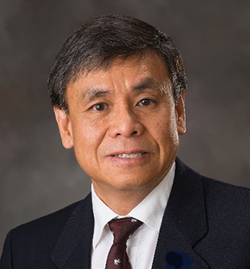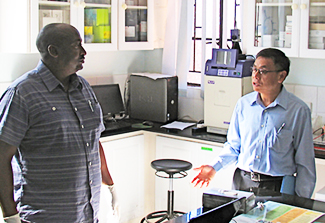Global health mentorship today: Charles Wood, PhD
July/August 2024 | Volume 23 Number 4
 Photo courtesy of Charles Wood Charles Wood, PhD
Photo courtesy of Charles Wood Charles Wood, PhD
Charles Wood is a professor in the Department of Interdisciplinary Oncology at LSU Health New Orleans.
When I was at University of Miami, I met a Fogarty fellow, Dr. Ganapati Bhat, a pediatrician at the University of Zambia. We started talking about HIV and cancers, and he told me about the cases of Kaposi’s sarcomas he’d seen in children. This led to a collaboration in Africa in 1995, almost 30 years ago. I’d never been to Africa. He was at University of Zambia, and all he had to do research with was his office—nothing else. In Zambia at the peak of the HIV epidemic, people were dying because of infection. We knew we’d have to do research capacity building, so we wrote grants and were fortunate to receive funding from Fogarty and the National Cancer Institute (NCI)—the first ever D43 HIV cancer research and training grant awarded.
For the program to be sustainable, my philosophy from the start was that the locals in Zambia had to take ownership. I knew of other groups working there, forming NGOs, bringing in foreign teams; some of them were insensitive to locals and they were not sustained. I decided not to station U.S. people there permanently. We could do this because of the partnership with Professor Bhat and his students. He has since passed away, yet his third-generation students are now our partners—they’re the leaders and principle investigators of the program. We are fortunate to have their help and their patient population. Through sharing of skills, we’ve done quite a bit in terms of understanding HIV-associated cancers, the immune response, and viral transmission in Africa.
 Photo courtesy of Charles WoodCharles Wood of LSU Health New Orleans talks with a mentee in a lab.
Photo courtesy of Charles WoodCharles Wood of LSU Health New Orleans talks with a mentee in a lab.
When I was an undergraduate at the University of Kansas, a top scientist at Abbott Laboratories, the late Dr. Arthur Hirata, decided to join academia and I did my honors thesis project with him. We had lunch together every day and talked about science and life. He convinced me to go to graduate school and do research (instead of going to medical school as I’d planned) because it has a bigger impact—he himself had developed the first diagnostic test for the hepatitis B virus, which had global impact. He recommended me to the top lab in immunology at Columbia University and later for a postdoc in Switzerland with a top molecular biologist. At the time, he’d visit me and was always there to guide me.
I believe mentorship is a one-to-one relationship. As a mentor, you have to have the mentee’s best interests in mind and they have to be able to come to you for anything, either personal or professional. It’s really important that they trust and respect you. When mentees first start working with me, I watch over them and design everything for them, including controls. In the end, I expect them to know so much that they become my mentors. I tell them,
Only then will you really be ready to go out on your own. Learning is never finished—new technologies, computers, AI—and we need mentoring in each area.
The society makes a difference. In China and other Asian countries, mentees show a level of respect that Western countries don't expect. In Africa, there’s a hierarchical relationship. They respect and listen to you, so you have to be very sensitive. You need to be careful in your terminology and avoid using colloquial terms that people there may misinterpret. You are coming in—with funding and research projects—and you need to treat them as equals, partners. I’ve also learned that some female students in Africa prefer female role models, so we try to have female seniors mentoring female juniors in our program.
In the U.S., mentors and mentees are becoming more equalized and that helps them be more open and communicative. On the other hand, you cannot be buddy-buddy all the time because your ability to correct things becomes much harder. So the relationship is dynamic, but it's still important to draw a line between yourself and your mentees.
More Information
Updated August 14, 2024
To view Adobe PDF files,
download current, free accessible plug-ins from Adobe's website.
Related World Regions / Countries
Related Global Health Research Topics